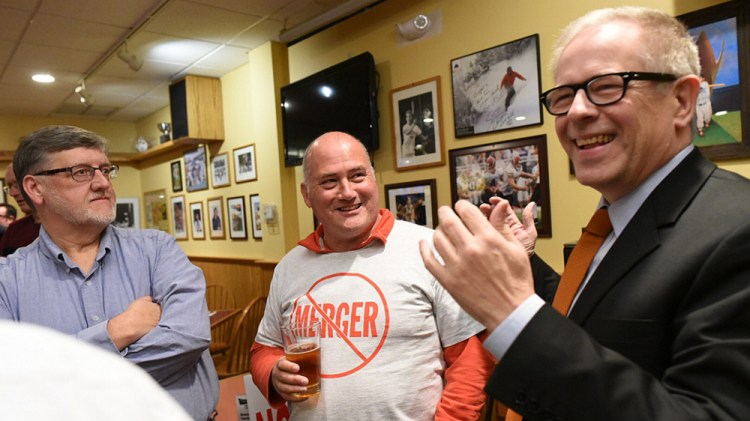LEWISTON — The proposed merger of Lewiston-Auburn went down in flames in November, but members of the anti-merger campaign aren’t finished.
Now, after a contentious campaign that pitted members of the same community against one another, they are hoping to use their influence to help shed positive light on the Twin Cities.
COLAC, or the Coalition Opposed to Lewiston-Auburn Consolidation, first formed as a “grass-roots” opposition to the idea of a merger, and found itself embroiled in the almost yearlong campaign toward a referendum. They found success in using mostly social media and public rallies to get the word out.
Robert Reed, chairman of Lewiston’s Finance Committee and a vocal member of the anti-merger group, said recently that even though the group was ultimately successful in November, members have some regrets about how it unfolded. He said the campaign between coalition and the pro-merger One LA “became so negative, and people were turned off by both sides.”
“Repair to our community is needed if people are willing to have an open mind,” he said.
Reed said the overall focus will be to support community efforts and programs to “raise the image of both cities and its citizens.” They plan to assist in planning and promoting efforts “to make our cities better and help those who work and play here.”
The first such effort, Reed said, is to work with Lewiston schools on a “fill the bus” event, hopefully in January, for classroom supplies that teachers need but were not budgeted.
“We have teachers’ supply closets that run dry often and we want to do something to tell the teachers they are appreciated,” he said.
The group, which includes Lewiston attorney Jim Howaniec and Auburn City Councilor Leroy Walker, would like to keep the acronym COLAC, but change what it stands for. It could prove to be a challenge.
Coalition members also feel as if they were successful in engaging the public, which is why the post-election discussion took place.
Bob Stone, a coalition member and Auburn city councilor until just a few weeks ago, said the campaign “sparked interest in local politics from many Auburn and Lewiston residents” who had been engaged or interested but not active.
“The Facebook group gave them a place to go to get informed, speak out and join a nonpartisan discussion forum,” Stone said. “There was such broad interest that COLAC founders felt that it would be a shame to waste that energy by disbanding the group.”
As a former city councilor, Stone said, “I saw, close up, the difficulty in getting people involved in local committees and COLAC might be a catalyst to encourage people to play formal roles in city affairs.”
As for the Lewiston-Auburn Joint Charter Commission, which spent three years of biweekly meetings drafting a new charter and consolidation agreement, the end was swift.
The group held a final meeting in November following the election. The only action taken was approving the minutes of the previous few meetings.
After that was over, commission member Chip Morrison said, the group headed out for a much-deserved drink.
arice@sunjournal.com
Send questions/comments to the editors.



Comments are no longer available on this story